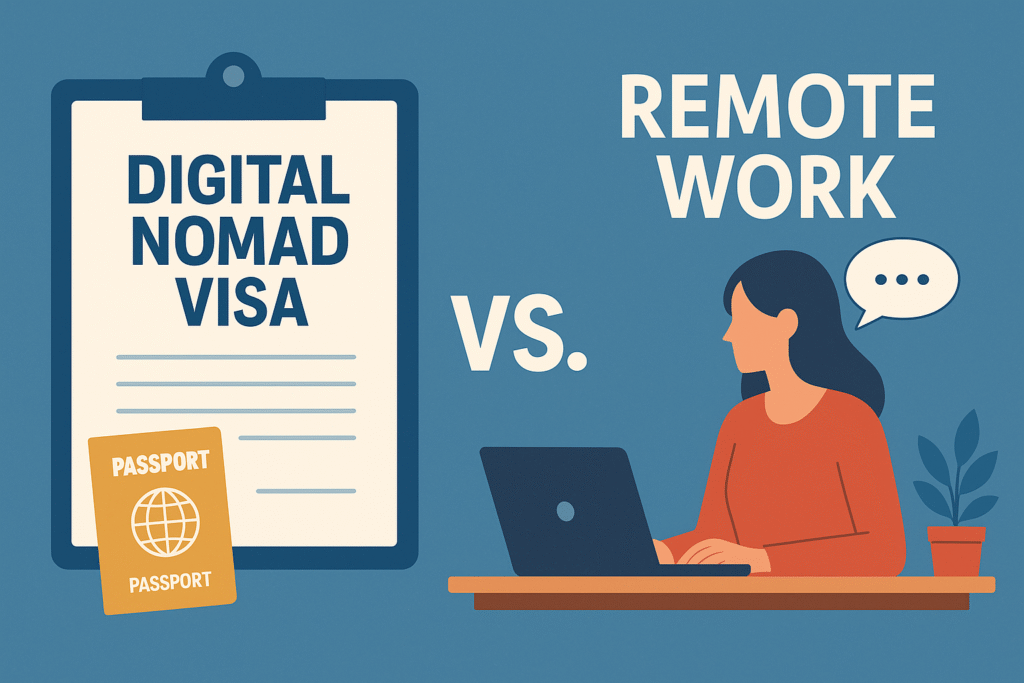Balancing work and travel has never been easier. As more professionals embrace the lifestyle of a digital nomad, countries are crafting special visa programs to attract them. Meanwhile, many remote employees simply continue their jobs online without changing legal status. Understanding the differences between a digital nomad visa and regular remote work privileges—along with the pros and cons of each option—can help you choose the right path for your situation.
Introduction: Why Compare Digital Nomad Visas and Remote Work?
The pandemic accelerated telecommuting, turning millions into casual or committed remote workers. While some professionals simply take their laptops on vacation, others are rethinking where home should be. Two terms arise repeatedly in online forums: digital nomad visa and remote work authorization. Both allow you to work from abroad, but the conditions differ significantly. Digital nomad visas are formal immigration pathways, while remote work often refers to performing your job online without special permission. To make an informed decision, it’s useful to examine the legal differences, costs and other pros and cons of these options.
Brazil introduced a Digital Nomad Visa (VITEM XIV) through Normative Resolution No. 45 in 2021. The visa provides a clear framework for foreigners whose income comes from employers or clients outside Brazil. Applicants must prove they can work remotely, present an employment or service contract and show proof of income of at least US$1,500 per month or US$18,000 in savings. The resolution allows a one‑year stay, renewable for another year if updated documents are provided. In contrast, remote work authorization usually means continuing your job online while staying under another visa (often a tourist visa) without explicit permission from the host country. Understanding these nuances helps digital nomads avoid legal pitfalls and maximize their experience.
What Is a Digital Nomad Visa?
A digital nomad visa is an official permit that allows foreigners to reside in a country while working for businesses or clients located elsewhere. Brazil’s version (VITEM XIV) is among the world’s most notable. According to the Brazilian National Immigration Council, a digital nomad is someone who “performs professional activities remotely using information and communication technologies” for a foreign employer. The visa requires:
- A valid passport, recent photograph and completed application form.
- A declaration confirming remote work capacity.
- An employment or service contract with a foreign employer.
- Proof of monthly income of at least R $8,206 (US$ 1,500 / €1,291) or a bank balance of R $98,476 (US$ 18,000 / €15,492).
- Evidence of health insurance valid in Brazil.
These requirements provide transparency and legal security. Holders can stay up to one year and renew for an equal period by submitting updated documents and a clean criminal record. Because it is a visa, you may open bank accounts, sign leases or register for services easily.
Advantages of Digital Nomad Visas
- Legal residency: Being lawfully present reduces anxiety about overstaying or violating immigration rules.
- Longer stay: One-year validity, renewable for another year, suits those who want to immerse themselves in local culture.
- Family inclusion: Spouses and dependents may be eligible for residence based on family reunification rules.
- Clear tax obligations: Although Brazil taxes residents after 183 days, clarity helps with planning.
- Access to services: Many landlords, phone companies and banks require proof of legal residence; a visa provides this.
Disadvantages of Digital Nomad Visas
- Documentation burden: Collecting contracts, bank statements and health insurance can be time‑consuming.
- Income threshold: Not all freelancers meet the monthly income requirement.
- Processing time: Consulates may take several weeks to issue visas.
- Potential tax liability: Residents may be subject to income tax ranging from 7.5% to 27.5% depending on income bracket (Brazil’s progressive tax system).
- Renewal requirements: Renewal demands updated criminal records and proof of continued remote work.
What Is Remote Work Authorization?
In many countries, including Brazil, there is no formal remote work visa outside the digital nomad scheme. However, people often work online while traveling under tourist or short-term visas. This practice is common but exists in a legal gray area. Some countries, like Portugal or Spain, offer limited remote work permissions under existing visas; in Brazil, there is no explicit authorization outside VITEM XIV.
When blogs refer to a “remote work authorization,” they typically mean a letter from an employer granting permission for telecommuting or verifying that the employer doesn’t object to the employee performing duties abroad. Such letters may be required by consulates or immigration authorities to prove remote work capacity. They are part of the digital nomad application process rather than an independent permit.
Advantages of Remote Work Without a Visa
- Simplicity: There’s often no need for extra documents beyond a valid tourist visa.
- Spontaneity: You can arrive and start working online immediately.
- Lower initial cost: You avoid visa fees and health‑insurance requirements.
- Short-term flexibility: Ideal for digital nomads staying less than 90 days.
Disadvantages of Remote Work Without a Visa
- Legal uncertainty: Working on a tourist visa may violate local labor or immigration rules.
- Short stay: Tourist visas often limit stays to 90 days in a 180-day period.
- Limited services: Without residence status, it’s harder to lease apartments or open bank accounts.
- Risk of denial: Border agents may turn you away if they suspect you plan to work.
- Tax complications: Staying long enough may trigger tax residency without clear documentation.
Key Differences Between Digital Nomad Visas and Remote Work Authorization
Legal status: A digital nomad visa grants official temporary residence, while remote work (without a visa) relies on tourist status. Formal residence offers more rights and security.
Duration: The visa provides up to one year, renewable for another year. Remote workers on tourist visas usually must leave after 90 days and can return only after a waiting period.
Income requirements: The visa requires proof of income or bank balance (US$1,500 per month or US$18,000 savings). Remote work without a visa has no specified thresholds but may not be legally allowed.
Rights and obligations: Digital nomad visa holders can open local bank accounts, sign leases and enjoy more stability. Remote workers using tourist visas are often limited to short-term rentals and may encounter difficulties signing legal contracts.
Family inclusion: The visa allows dependents (spouse, partner, parents, children) to apply for residency under family reunion rules. Remote workers traveling on tourist visas must manage each family member’s visa separately.
Taxation: Visa holders become tax residents after 183 days and may need to declare global income. Remote workers on shorter stays may avoid tax residence but could face complexity if they stay longer.
Documentation and Process: What You Need to Prepare
Digital Nomad Visa Documentation
To apply for a digital nomad visa in Brazil, you should prepare the following:
- Valid travel document (passport) and a recent 3×4 cm (1.18×1.57 inch) photograph.
- Completed visa application on the consulate’s website.
- Proof of remote work: Declaration that you can work remotely, plus an employment or service contract linking you to a foreign employer.
- Financial proof: Bank statements or pay slips showing monthly earnings of at least US$1,500 (≈R $8,206 / €1,291) or a bank balance of US$18,000 (≈R $98,476 / €15,492).
- Police clearance: Criminal background check from your country of residence.
- Health insurance valid in Brazil for the entire stay.
- Itinerary details: Return ticket and planned accommodation.
Once approved, visa holders must register with Brazil’s Federal Police within 90 days of arrival to obtain a CRNM (residence card). Renewal requires updated documents (remote work proof, income statements) and a clean criminal record.
Remote Work Letters and Other Authorization Documents
There is no distinct remote work authorization in Brazil, but some consulates ask for a remote work authorization letter from your employer to prove you will continue working for a foreign entity. This letter typically outlines:
- The employer’s name, address and contact details.
- Confirmation that your role can be performed online.
- Approval for you to work from abroad without affecting the company’s operations.
While these letters are essential for digital nomad visa applications, they do not replace the need for a visa. Without proper immigration status, working remotely in Brazil could be interpreted as unauthorized work.
Costs and Fees
- Visa fee: Brazilian digital nomad visas vary by consulate but usually cost around R $1,040 (≈US$190 / €160).
- Health insurance: Private travel health insurance plans cost roughly R $300–R $800 per month (US$55–US$145 / €45–€125).
- Document preparation: Police certificates and notarized translations may add R $500–R $1,000 (US$90–US$180 / €80–€160).
- Living expenses: According to Numbeo, a single person in Rio de Janeiro needs around R $3,258 per month (US$596 / €513) for basic expenses excluding rent. A family of four spends about R $11,401 (US$2,088 / €1,796). Meals range from R $25–R $60 (US$4.60–US$11 / €4–€10) at inexpensive restaurants.
Understanding these costs will help you budget effectively, whether you choose a visa or decide to work remotely on shorter stays.
Lifestyle Considerations: Climate, Culture and Internet
Brazil’s appeal goes beyond visas. The country offers diverse climates—from tropical beaches to cooler highland cities. In Rio de Janeiro, average summer highs reach 31 °C (88 °F) and lows stay around 24 °C (75 °F), while winter highs are about 25 °C (77 °F) and lows are 19 °C (66 °F). Such mild climates make outdoor work at cafes or co‑working spaces comfortable year‑round. Distances between cities are large; for example, São Paulo is roughly 430 km (267 miles) from Rio, requiring a short flight or an intercity bus ride.
Internet infrastructure is reasonably good in major cities. Broadband speeds often exceed 100 Mbps, and fiber connections are widely available. Co‑working spaces and digital nomad hubs can be found in Rio, São Paulo, Florianópolis and Salvador, offering fast Wi‑Fi, networking opportunities and community events. For those traveling to smaller towns or coastal villages, mobile internet via 4G may be sufficient; 5G networks are expanding in urban areas.
A digital nomad visa can enable you to explore Brazil’s many regions at a leisurely pace, while remote workers on tourist visas may need to limit stays in each place due to time constraints.

Pros and Cons: A Balanced View
Pros of Digital Nomad Visas
- Security: Legal residency ensures you won’t face fines or deportation for working.
- Stability: You can rent apartments long-term and register for services.
- Community: Visa holders can join local nomad networks and events, meeting others who share similar goals.
- Renewability: A one‑year stay with a one-year extension offers time to settle and grow a business.
- Family-friendly: Bring your partner or children without additional work permits.
Cons of Digital Nomad Visas
- Upfront costs: Visa fees, insurance and documentation add up.
- Income threshold: Not accessible for entry-level freelancers.
- Administrative burden: Government paperwork can be complex.
- Tax responsibilities: Longer stays may require filing Brazilian taxes.
- Time commitment: Committing to a year may be daunting if you’re uncertain about staying that long.
Pros of Remote Work Without a Visa
- Flexibility: Perfect for short-term stays or experiments with different locations.
- Lower cost: No visa fees and fewer documents.
- Spontaneous travel: Plan trips on the fly without waiting for consular approval.
- Simpler taxation: Short stays usually avoid local tax residency.
- Work‑life balance: Experience multiple countries quickly.
Cons of Remote Work Without a Visa
- Immigration risks: You might be denied entry or asked to leave if authorities suspect unauthorized work.
- Short stays: Most tourist visas limit stay to 90 days in a 180-day period.
- Service restrictions: Opening bank accounts, signing leases or buying cars may not be possible.
- Fewer protections: You’re subject to tourist laws, which don’t prioritize worker rights.
- Limited networking: Short visits reduce the ability to build community.
Deciding Which Option Is Right for You
Your decision should depend on travel plans, financial capacity and risk tolerance. If you earn more than US$1,500 per month, want to stay for 6–24 months, and value legal stability, a digital nomad visa is probably the best choice. The visa also suits families and couples who need predictable schooling and healthcare.
If you are testing the waters, plan to stay three months or less in each location, or don’t meet the income requirement, working remotely on a tourist visa might suffice. Just remember the legal risks: always carry an employer authorization letter, avoid drawing attention to your work and never accept local clients.
Be aware that each country has different rules. Some, like Portugal and Spain, offer “remote work” or temporary relocation visas with lower income thresholds. Others, like Germany’s “Freiberufler” visa, require in-country clients. Always verify requirements before booking flights.
Additional Tips for North Americans and Europeans
- Health insurance: U.S. and Canadian citizens should ensure international coverage, as domestic plans rarely reimburse abroad. European travelers with EHIC cards still need private insurance outside Europe.
- Currency: The Brazilian Real (BRL) fluctuates; in August 2025, the average exchange rate was 1 USD = 5.47 BRL and 1 EUR = 6.36 BRL. Always budget in multiple currencies to anticipate changes.
- Language: Portuguese is the official language. Learning basic phrases will enhance your experience.
- Safety: Like any large country, Brazil has safe and less safe areas. Research neighborhoods before renting and join expat communities for up‑to‑date advice.
- Cultural respect: Brazilians value personal relationships. Building rapport with landlords, co‑workers and service providers can make everyday life smoother.
Case Studies: Real-Life Scenarios
To bring this discussion to life, consider three digital nomads:
- Alex, a freelance programmer from Canada: Alex earns around R $12,000 (US$2,200 / €1,900) per month. He wants to spend at least a year exploring Brazil. Alex applies for the digital nomad visa and registers with the Federal Police. He enjoys the ability to open a bank account, rent an apartment in Rio de Janeiro and attend local co‑working events. The one‑year validity lets him visit multiple cities without worrying about visa runs.
- Marta, a graphic designer from Spain: Marta makes R $5,000 (US$910 / €790) per month and isn’t sure she’ll stay in Brazil long-term. She decides to work remotely on a tourist visa for two months in Florianópolis. Although she loves the beaches and café culture, she struggles to open a local bank account and has to pay rent through an intermediary. When her tourist visa expires, she returns to Europe. The short stay allowed her to explore but limited her ability to integrate.
- Ethan and Olivia, a couple from the U.S.: Ethan is a remote marketing consultant earning R $15,000 (US$2,730 / €2,340) per month; Olivia is a writer with similar income. They plan to spend a year traveling across Brazil and want to bring their two children (ages 6 and 8). They apply for digital nomad visas for both adults and family reunification visas for the kids. The family enjoys stable schooling options, easier leasing processes and participates in local communities, highlighting the family-friendliness of the digital nomad path.
These stories show how your income, travel length and personal situation influence your decision. There’s no one‑size‑fits‑all answer; the right choice depends on your goals.

Practical Planning and Budgeting
When planning to work from Brazil, create a budget that includes:
- Housing: Monthly rent for a one-bedroom apartment in Rio’s city center averages R $2,300 (US$421 / €363). Outside the city center, it drops to around R $1,600 (US$293 / €253).
- Utilities: Electricity, water, gas and internet cost roughly R $400 (US$73 / €63) monthly.
- Transportation: A monthly metro or bus pass costs R $220 (US$40 / €35). Taxis start at R $6 (US$1.10 / €0.95) plus R $2 (US$0.37 / €0.32) per km.
- Dining out: A mid-range three-course meal for two costs about R $150 (US$27 / €24).
- Co‑working memberships: Prices vary by city but average R $400–R $800 (US$73–US$146 / €63–€126) per month.
Note that these estimates can fluctuate with inflation and exchange rates; always check current rates and consider using multiple credit cards or bank accounts to manage currency variations.
Tips for a Successful Digital Nomad Experience in Brazil
- Prepare documents early: Gather police certificates, translations and proof of income well before applying.
- Use digital tools: Apps like Wise or Revolut ease currency exchanges; coworker.com helps you find co‑working spaces.
- Join communities: Groups like Digital Nomads Brazil (on Facebook) or local meet‑ups provide advice, housing tips and friendship.
- Respect visas: Avoid overstaying; if you decide to stay longer, apply for an extension promptly.
- Stay informed: Immigration rules can change. Monitor official government websites or consult consulates for updates.
Conclusion
The growth of remote work has blurred the line between travel and living abroad. Whether you pursue a digital nomad visa or simply continue your remote work while traveling, understanding the differences and evaluating the pros and cons is critical. Digital nomad visas offer legal certainty, long-term stability and access to services, but they require proof of income, documentation and commitment. Remote work without a visa is flexible and low-cost but may entail legal risks and shorter stays.
For North American and European remote workers, Brazil’s digital nomad visa provides a unique opportunity to enjoy the country’s rich culture, warm climate and affordable living. By assessing your personal goals, income and travel plans, you can choose the path that best aligns with your nomadic dreams.
References
- Brazilian National Immigration Council (CNIG). Resolução Normativa nº 45/2021 – definition of digital nomad, requirements and proof of income: gov.br.
- Brazilian National Immigration Council (CNIG). Articles 4–6 of RN 45/2021 – list of required documents, proof of digital nomad status and renewal conditions: portaldeimigracao.mj.gov.br.
- Numbeo. Cost of Living in Rio de Janeiro – monthly expenses for individuals and families: numbeo.com.
- Timeanddate.com. Climate data for Rio de Janeiro – average temperatures by month: timeanddate.com.
- Exchange-rates.org. USD to BRL and EUR to BRL exchange rates (August 2025): exchange-rates.org






